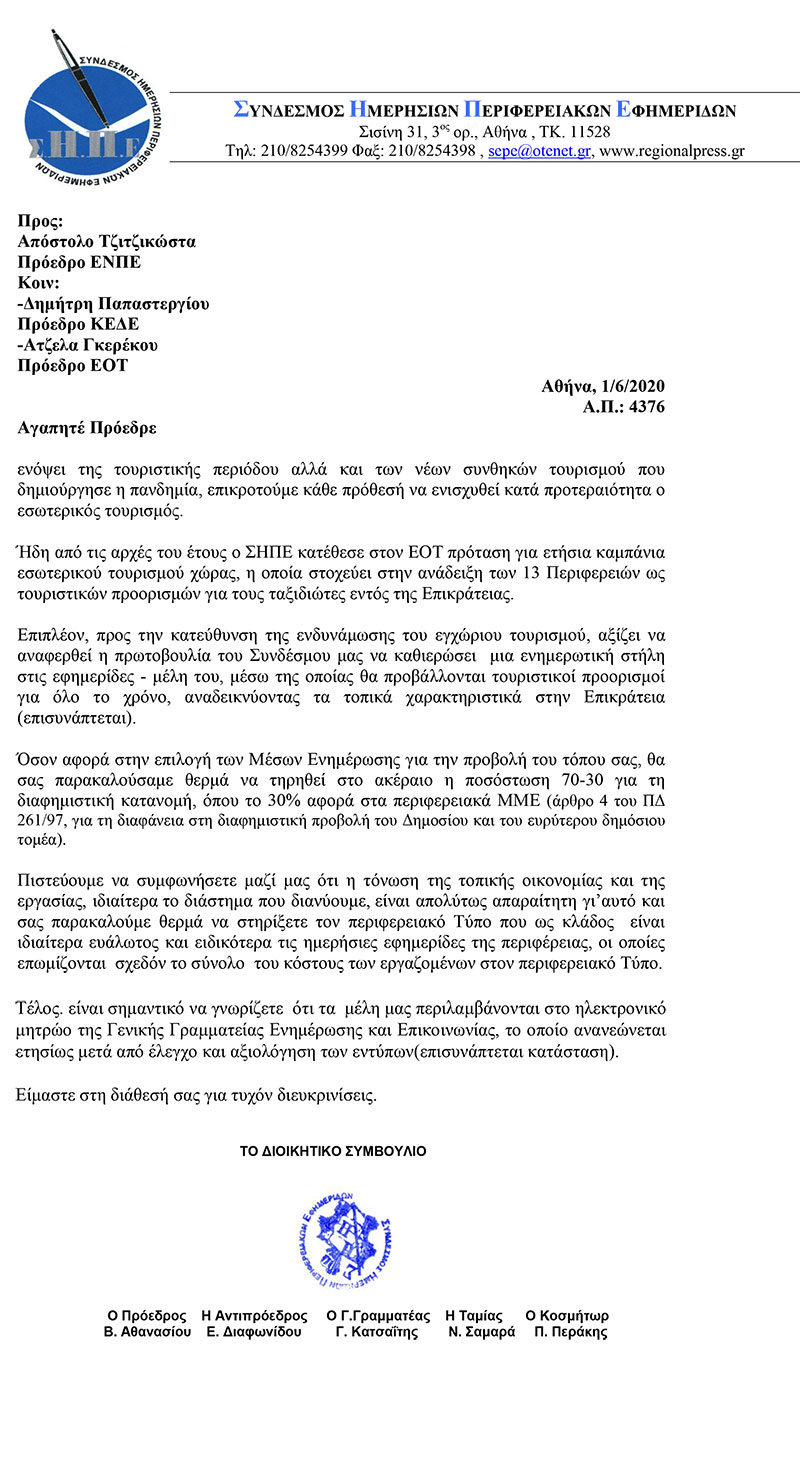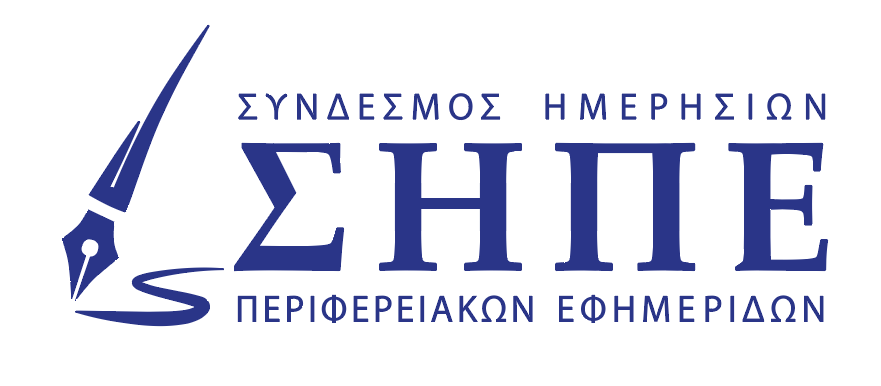
Προς:
Κο Άδωνη Γεωργιάδη,
Υπουργό Ανάπτυξης
Κοιν:
Κο Στέλιο Πέτσα
Κυβερνητικό εκπρόσωπο
Αθήνα, 29/5/2020
Αρ. Πρωτ: 4374
ΕΠΕΙΓΟΝ
Αξιότιμε κε Υπουργέ,
Εκφράζουμε την έντονη δυσαρέσκειά μας γιατί εξαιρούνται του χρηματοδοτικού Προγράμματος ΤΕΠΙΧ ΙΙ, οι επιχειρήσεις περιφερειακού Τύπου, παρά το γεγονός ότι ο Κωδικός τους Αριθμός Δραστηριότητας (ΚΑΔ 5813) συμπεριελήφθη στον κατάλογο των πληττόμενων επιχειρήσεων από την πανδημία του κορονοϊού.
Αυτή η εντελώς ατεκμηρίωτη σε βάρος των επιχειρήσεων Τύπου κατάσταση, εκδηλώνεται σε συνέχεια της ματαίωσης αρχικώς και πάντως μέχρι ώρας αναζητούμενης εφαρμογής του Προγράμματος ενίσχυσης τους.
Αν δεν εκληφθεί αυτή η παράλειψη ως το προϊόν ασυνεννοησίας και πάντως έλλειψης συντονισμού ανάμεσα στις εμπλεκόμενες διοικητικές Αρχές και Υπηρεσίες, θα είναι η απόδειξη συνειδητής επιθετικής στάσης απέναντι στις επιχειρήσεις περιφερειακής δημοσιογραφίας, που στάθηκαν όρθιες ιδίαις δυνάμεις ολόκληρη την περίοδο της καραντίνας και συνεχίζουν να ανταποκρίνονται στο καθήκον τους. Εσείς;
ΠΡΟΣ:
Κο Αδωνη Γεωργιάδη, υπουργό Ανάπτυξης
ΚΟΙΝ:
-Κο Στέλιο Πέτσα, υφυπουργό στον Πρωθυπουργό
-Ανεξάρτητη Αρχή Δημοσίων Συμβάσεων
-Κοινοβουλευτικά κόμματα
Αθήνα, 14/5/2020
Αρ. Πρωτ.4367
Αξιότιμε κε Υπουργέ,
Παρά το βεβαρημένο σας πρόγραμμα, είναι επιβεβλημένο να σας επιστήσουμε την προσοχή για την έναρξη της ισχύος της παρ. 12, του άρθρου 379, του Νόμου για τις Δημόσιες Συμβάσεις Ν.4412/2016, μια διάταξη που αφορά στην κατάργηση των υποχρεωτικών δημοσιεύσεων στον περιφερειακό και τοπικό Τύπο από 1/1/2021, την άρση της οποίας διεκδικούμε μαζί με τις Ενώσεις περιφερειακού και τοπικού Τύπου από το 2016 και έπειτα.
Μέχρι τις 31/12/2020 διατηρούνται οι παντοειδείς δημοσιεύσεις των κάθε είδους στοιχείων που αφορούν συμβάσεις έργων, προμηθειών ή υπηρεσιών των φορέων του Δημοσίου και ευρύτερου δημόσιου τομέα, αλλά από 1/1/2021 αναρτώνται υποχρεωτικά μόνο στο ΚΗΜΔΗΣ.
Αξιότιμε κε Υπουργέ,
Η κατάργηση των υποχρεωτικών δημοσιεύσεων δεν θα πλήξει μόνο τα μειούμενα έσοδα των επιχειρήσεών μας αλλά πρωτίστως θα πληγούν οι αρχές της διαφάνειας, της νομιμότητας, της χρηστής διοίκησης και της ευρείας ενημέρωσης των πολιτών, αρχές που αποτελούν στοιχειώδη υποχρέωση μιας ευνομούμενης πολιτείας, όπως συμβαίνει στην πλειοψηφία των ευρωπαϊκών χωρών.
Διεκδικούμε άμεσα την έκδοση ΚΥΑ για συνέχιση του υποχρεωτικού χαρακτήρα των δημοσιεύσεων στον περιφερειακό Τύπο ή τουλάχιστον την πενταετή παράταση της υποχρεωτικότητας, έως ότου επανέλθουν οι συνθήκες για έναν ουσιαστικό διάλογο που θα περιλαμβάνει και την αξιοποίηση των βέλτιστων παραδειγμάτων ευρωπαϊκών χωρών.
Είμαστε στη διάθεσή σας για οποιαδήποτε πρόσθετη πληροφορία ή συνεργασία τυχόν απαιτηθεί.
Το Διοικητικό Συμβούλιο
